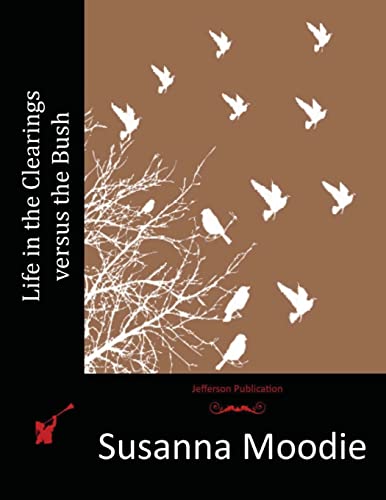Life in the Clearings versus the Bush
Susanna Moodie
BOOK REVIEW

In a world where survival seems synonymous with an eternal struggle against nature, Life in the Clearings versus the Bush by Susanna Moodie stands out not just as a memoir, but as an evocative exploration of the heart's compass when faced with the wildest adversities. Dive into the harsh yet captivating narrative that is equal parts memoir and colonial chronicle, where the tender threads of human resilience weave through the unforgiving wilderness of Canada.
Moodie's journey begins in the 1830s, a time swirling with the intoxicating allure of exploration and yet layered with the grim realities of settler life. With her sharp pen, she paints a stark juxtaposition between the civilized clearings, where humanity attempts to impose order and the chaotic beauty of the bush, raw and teeming with untamed life. This is not merely a tale of survival but a fierce reflection on the duality of existence between civilization and the wild-a metaphor begging to be unraveled by every reader yearning for deeper understanding.
The reader is pulled into Moodie's world through vivid imagery and raw emotion. Every word strikes at the core of what it means to confront the unknown. Imagine experiencing the biting cold of a winter's night, the relentless swarms of mosquitoes in summer, and the gut-wrenching uncertainty that comes with each season. Critics have lauded Moodie's ability to translate the sensory overload of nature's beauty and brutality, crafting a narrative tapestry that evokes the very essence of her experiences. Readers have lost themselves in her vivid descriptions, stating it feels as if they can touch the frost of the morning dew or hear the rustling of leaves amidst an impending storm.
However, Moodie's account is not just an ode to nature; it is also a glaring examination of societal norms and expectations in a rapidly changing world. With razor-sharp insight, she critiques the roles assigned to women during her era. Her reflections challenge the very fabric of gender and societal expectations, nudging readers to consider how much has truly changed in the dynamic of male and female roles. Some commenters view her work as feminist in its foundation-a bold statement for a woman of her time. Others argue she is merely chronicling her experiences without intention. Yet, isn't that the beauty of literature-the invitation for each individual to take away what they need most?
The emotional depth of Life in the Clearings versus the Bush is amplified by Moodie's unflinching honesty. Her encounters with the local Native American populations are striking, sparking conversations about cultural exchange, conflict, and mutual respect. The warmth and wisdom she ascribes to these communities serve as a counterpoint to the harsh realities of colonial intrusion. Readers often find themselves wrestling with feelings of admiration for her forthrightness yet discomfort at the historical implications of her narrative. This complex landscape of emotions leaves a lasting impact, forcing one to grapple with their perspectives on colonialism and its aftermath.
What truly captivates is Moodie's lyrical style-poetic in its uptake and visceral in its delivery. Die-hard enthusiasts of classic literature have praised her work for its authenticity, often claiming it remains relevant even today due to its themes of perseverance, nature versus nurture, and the struggle for identity amidst chaos. This timelessness evokes a profound sense of urgency in understanding our relationship with nature and each other. It's a call to arms for modern readers to reevaluate their positions within the ecosystems they inhabit.
But as with any heartfelt narrative, some critiques arise. Detractors suggest that Moodie's romanticism of nature undermines the real struggles faced by settler communities, presenting an idealized version of a harsh reality. Yet, is that not the very power of a memoir? To offer one perspective, an invitation into a specific emotional journey? To set the canvas for introspection? It seems Moodie does precisely that-she does not seek to romanticize, but rather, she chronicles her truth against the tumult of existence.
In the wake of reading Life in the Clearings versus the Bush, the modern reader is left with more than just a story. They are handed a mirror-one that reflects our own tumultuous relationships with nature, societal expectations, and perhaps most importantly, ourselves. This is not merely an account of life; it is an evocative exploration of how we exist, struggle, and ultimately thrive within the worlds we navigate.
So, as you hold this poignant work in your hands, ask yourself-what does it mean to live in clearings, and what uncharted territories lie hidden within the brush of your life? 🌳
📖 Life in the Clearings versus the Bush
✍ by Susanna Moodie
🧾 106 pages
2015
#life #clearings #versus #bush #susanna #moodie #SusannaMoodie